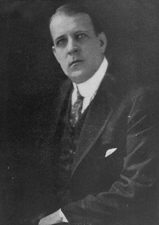David I. Walsh
David Ignatius Walsh (born November 11, 1872 in Leominster , Worcester County , Massachusetts , † June 11, 1947 in Boston , Massachusetts) was an American politician and from 1914 to 1916 governor of the state of Massachusetts. Between 1919 and 1947 he represented his state with a brief break in the US Senate .
Early years and political advancement
David Walsh was the son of a poor family who immigrated from Ireland . His father died when he was twelve and his mother made a living running a hotel with 25 beds. This enabled her to finance at least primary school education for her ten children. David was able to attend Clinton High School until 1890 in this way . Until 1893 he attended the Holy Cross School. He then studied law at Boston University until 1897 . After his admission to the bar, he began to work in this profession in Fitchburg and later in Boston.
Walsh became a member of the Democratic Party . From 1900 to 1901 he was a member of the House of Representatives from Massachusetts and from 1913 to 1914 he was deputy governor of Governor Eugene Foss . On November 4, 1913, he was himself elected governor of Massachusetts. He prevailed in a field of several candidates with 39.8 percent of the vote, ahead of Charles S. Bird from the Progressive Party (27.7 percent) and the Republican Augustus Peabody Gardner (25.3 percent).
Massachusetts Governor
Walsh took up his new office on January 8, 1914 and was able to exercise it until January 6, 1916 after re-election in 1914. He campaigned for women's suffrage , which he wanted to include in the state constitution of Massachusetts. But at that time he could not get his way. The Law on Compensation for Victims of Work Injuries was improved, and distance learning became possible for the first time in Massachusetts. After the screening of the film Birth of a Nation , which sparked racist tendencies and led, among other things, to the founding of the Ku Klux Klan , Governor Walsh called for film censorship to prevent similar incidents. In 1915, David Walsh ran unsuccessfully for a third term as governor.
Walsh in the US Senate
After his governorship ended, Walsh was a delegate to a conference to revise the Massachusetts constitution in 1917 and 1918. After he had been elected to the US Senate in November 1918, he was able to complete a full legislative period as a Class 2 Senator between March 4, 1919 and March 3, 1925 . In 1924, however, he was not re-elected, after which he again worked as a lawyer in Boston.
After the death of Senator Henry Cabot Lodge in 1926, Walsh was elected as his successor as a Class 1 Senator . The office had meanwhile been exercised by William M. Butler until the election of Walsh . After several re-elections, Walsh was able to exercise his mandate in Congress between November 2, 1926 and January 3, 1947 . He was temporarily chairman of the committee for education and labor as well as a member of the naval committee. Until the Japanese attack on Pearl Harbor on December 7, 1941, Walsh was opposed to American entry into World War II . Instead, he advocated a neutral stance for his country in this war. In 1946 he missed re-election to Congress.
After his tenure in Congress ended, Walsh withdrew from politics. He died in Boston on June 11, 1947 and was buried in Clinton , where he had spent the last years of his life.
Web links
- David Walsh in the National Governors Association (English)
- David I. Walsh in the Biographical Directory of the United States Congress (English)
- David I. Walsh in the database of Find a Grave (English)
| personal data | |
|---|---|
| SURNAME | Walsh, David I. |
| ALTERNATIVE NAMES | Walsh, David Ignatius |
| BRIEF DESCRIPTION | American politician |
| DATE OF BIRTH | November 11, 1872 |
| PLACE OF BIRTH | Leominster , Massachusetts |
| DATE OF DEATH | June 11, 1947 |
| Place of death | Boston , Massachusetts |



